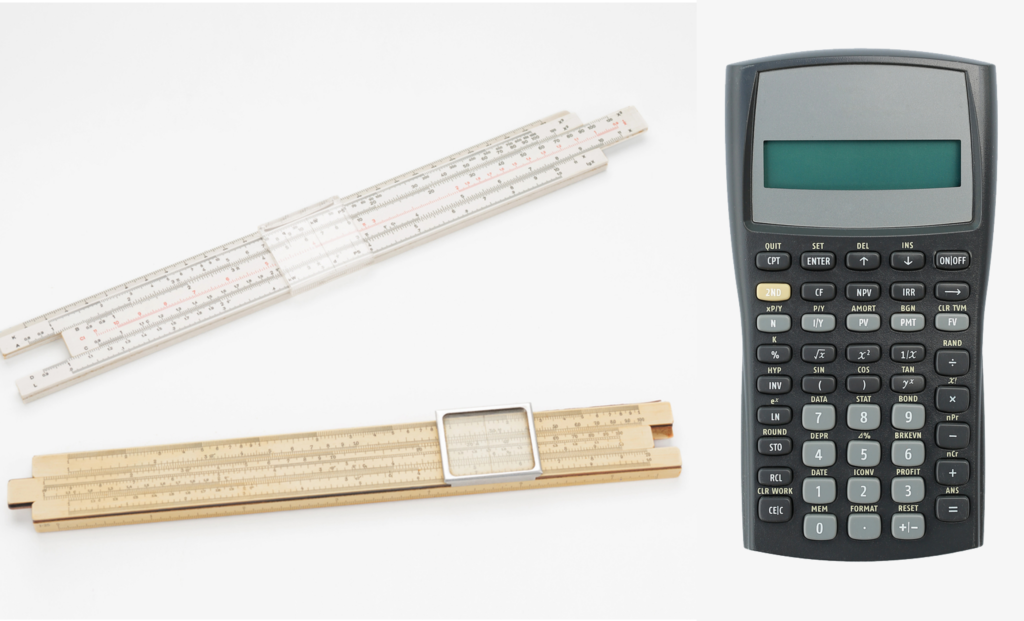In this article, we delve into the critical importance of mastering fundamental math skills without calculators in an era overwhelmingly dominated by machines.
From the historical transition from slide rules to modern calculators, we explore how this shift has influenced students’ abilities to perform basic arithmetic without digital aid. Highlighting the dependency on calculators, we examine its impact on students’ understanding of fractions, rational expressions, and estimation.
Through a detailed analysis, we reveal how reliance on calculators can undermine the development of essential math skills, leading to challenges in academic performance.
Furthermore, we offer strategies for students and parents in homeschool settings to balance the use of calculators while ensuring that fundamental arithmetic skills remain sharp.
The Evolution from Slide Rules to Calculators
One inspiring example of mastering math skills without calculators comes from one of my favorite movies, “Apollo 13.” I adore this film for many reasons, particularly for the scenes where NASA engineers use their “slide rules” to solve mathematical problems. Of course, if you’re familiar with a slide rule, you might be revealing your age, but for the younger generation, a slide rule was a handheld mechanical calculator. Indeed, it worked wonderfully – just ask the astronauts who landed on the moon.
After slide rules, calculators became our new mathematical tool. Over time, students did less and less arithmetic by hand, as calculators made solving problems much easier. However, this trend resulted in students becoming less proficient in arithmetic using pencil and paper.
As a math teacher, I’ve witnessed this repeatedly: “calculator-itis,” a condition where a student can’t recall basic math skills when holding a calculator. Let me show you three areas where “calculator-itis” has detrimentally affected students’ math grades.
The Rise of ‘Calculator-ites’: A Decline in Basic Math Skills
“Calculator-ites” is a condition I’ve observed as a math teacher, where students struggle with basic math when relying on calculators. This issue manifests in three key areas:
- Fractions
- Rational Expressions
- Estimation
Fractions: The Nightmare of Many Students
For many students fractions are their worst nightmare. Many students for whatever reason just hate working with fractions. I understand that tasks like reducing and finding the LCD can be tedious and boring. However students must master these procedures to do well in middle and high school math. Many students will take the path of least resistance and convert fractions into decimals (using that handy $15 calculator) and turn fraction problems into decimal problems. What’s wrong with this? Well if a student turns all fraction problems into decimal problems they will never fully master and comprehend fraction procedures. As a student continues these “short cuts” they make their fraction skills weaker and weaker- not good.
Rational Expressions: Where Calculators Fall Short
Even worse than fractions, rational expressions are like fractions with a twist—they come with variables… yummy! Welcome to the algebraic jungle. This is where ‘calculator-itis’ really starts to wreak havoc on a student’s math health.
Remember how our students got into the habit of turning every fraction into a decimal with their calculators? Well, that little trick won’t do them any favors with rational expressions. Don’t believe me? Go ahead, try typing ‘x / y’ into your calculator and see what it reads back at you – trust me, it’s not going to be a number.
Unlike regular fractions, mastering rational expressions requires students to deeply understand the step-by-step procedures used in fraction operations. As the old saying goes, “pay me now or pay me later.” While students might temporarily bypass the complexities of fractions using calculators, eventually, “calculator-ites” will catch up with them, negatively impacting their grades.
Estimation: The Compromise of Accuracy for Convenience
Will you accept this “estimation” as my answer? That’s a common question when fractions morph into decimals, leading students to start “rounding off” these numbers.
Take, for example, the fraction 13/17. Convert it into a decimal using a calculator, and you get 0.76470588—a rather lengthy decimal. What many students do is “chop off” the decimal so it’s nice and easy to work with; in this case, they might round it to 0.7647 or 0.765.
However, the moment a student rounds off a decimal, their answer becomes an estimation, no longer as exact as the original fraction. Even if they know the steps to solve a problem, converting fractions to decimals can reduce the accuracy of their solution.
On tests and quizzes, most math teachers look for exact solutions. So, if a student provides an approximation, they’re likely to lose points.
Hopefully, this illustrates another example where a calculator, if not used judiciously, can be more of a hindrance than a help.
Embracing Calculators Without Losing Fundamental Skills
While calculators are invaluable tools, especially in complex mathematical areas, maintaining a balance is crucial. Students should be proficient in using calculators without neglecting fundamental math skills like fractions and estimations.
Final Thoughts
Let’s wrap up our discussion with some well-deserved praise for the calculator. I wholeheartedly agree that calculators are important and excellent tools that students need to use and master.
Moreover, calculators serve as fantastic teaching aids and are absolutely essential in more complex mathematics, including trigonometry, logarithms, and graphing.
The main takeaway from my article is this: students can own as many calculators as they wish – one, two, three, or even a dozen. However, it’s vital that they ensure their proficiency in handling math with mental calculations and the good old pencil and paper.











